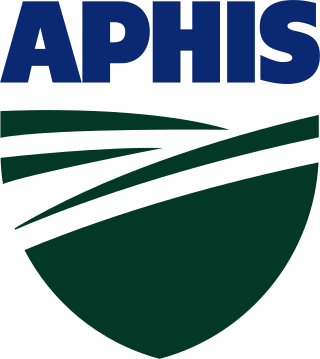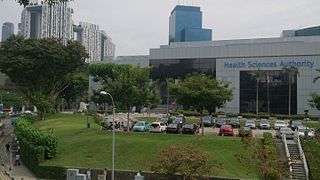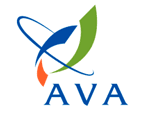
The Animal and Plant Health Inspection Service (APHIS) is an agency of the United States Department of Agriculture (USDA) based in Riverdale, Maryland responsible for protecting animal health, animal welfare, and plant health. APHIS is the lead agency for collaboration with other agencies to protect U.S. agriculture from invasive pests and diseases. APHIS's PPQ is the National Plant Protection Organization for the U.S., and the agency's head of veterinary services/veterinary Deputy Administrator is the Chief Veterinary Officer of the United States.
The Canadian Food Inspection Agency is a regulatory agency that is dedicated to the safeguarding of food, plants, and animals (FPA) in Canada, thus enhancing the health and well-being of Canada's people, environment and economy. The agency is responsible to the Minister of Health.
Agriculture and Agri-Food Canada is the department of the Government of Canada responsible for the federal regulation of agriculture, including policies governing the production, processing, and marketing of all farm, food, and agri-based products. Agriculture in Canada is a shared jurisdiction and the department works with the provinces and territories in the development and delivery of policies and programs.
AsureQuality Limited is a State-Owned Enterprise (SOE) fully owned by the government of New Zealand. The company's core business is food quality assurance with its services including certification, inspection, testing, and training. AsureQuality has over 1700 staff at over 100 locations throughout New Zealand. AsureQuality also has a joint venture partner, Bureau Veritas.. Bureau Veritas and AsureQuality have two joint ventures, BVAQ Australia and BVAQ SouthEast Asia.

The statutory boards of the Government of Singapore are autonomous organisations that have been tasked to perform an operational function by legal statutes passed as Acts in the Parliament of Singapore. The statutes define the purpose, rights and powers of each authority. These organisations would usually subsequently report to one specific ministry. This list includes both current and new statutory boards formed.

National Environment Agency (NEA) is a statutory board under the Ministry of Sustainability and the Environment of the Government of Singapore.
Pesticide residue refers to the pesticides that may remain on or in food, after they are applied to food crops. The maximum allowable levels of these residues in foods are stipulated by regulatory bodies in many countries. Regulations such as pre-harvest intervals also prevent harvest of crop or livestock products if recently treated in order to allow residue concentrations to decrease over time to safe levels before harvest.

The Central Science Laboratory (CSL) was an executive agency of the UK government branch, the Department for Environment, Food and Rural Affairs (DEFRA). It is now part of the Food and Environment Research Agency, which is in turn part of DEFRA.
A food safety agency or food administration or Food Safety Authority is a government agency responsible for ensuring the safety, quality, and proper labeling of food products within a country or region. These agencies play a crucial role in protecting public health by establishing and enforcing regulations and standards to ensure that food produced, imported, processed, distributed, and sold is safe for consumption.

The Health Sciences Authority (HSA) is a statutory board under the Ministry of Health of the Government of Singapore. It is a multi-disciplinary agency responsible for applying medical, pharmaceutical, and scientific expertise to protect and advance public health and safety.

Food safety is used as a scientific method/discipline describing handling, preparation, and storage of food in ways that prevent foodborne illness. The occurrence of two or more cases of a similar illness resulting from the ingestion of a common food is known as a food-borne disease outbreak. This includes a number of routines that should be followed to avoid potential health hazards. In this way, food safety often overlaps with food defense to prevent harm to consumers. The tracks within this line of thought are safety between industry and the market and then between the market and the consumer. In considering industry-to-market practices, food safety considerations include the origins of food including the practices relating to food labeling, food hygiene, food additives and pesticide residues, as well as policies on biotechnology and food and guidelines for the management of governmental import and export inspection and certification systems for foods. In considering market-to-consumer practices, the usual thought is that food ought to be safe in the market and the concern is safe delivery and preparation of the food for the consumer. Food safety, nutrition and food security are closely related. Unhealthy food creates a cycle of disease and malnutrition that affects infants and adults as well.

The National Parks Board (NParks) is a statutory board under the Ministry of National Development of the Government of Singapore.
Manitoba Agriculture—officially the Department of Agriculture and Resource Development —is the department of the Government of Manitoba responsible for the agriculture and natural resources sectors in Manitoba, including agrifood, agriproduct, and food safety, as well as animal health and welfare.

The Ministry of National Development is a ministry of the Government of Singapore responsible for the formulation and implementation of policies related to the land-use planning and infrastructure development in Singapore.
Veterinary public health (VPH) is a component of public health that focuses on the application of veterinary science to protect and improve the physical, mental and social well-being of humans. In several countries activities related to VPH are organized by the chief veterinary officer.
Agriculture in Singapore is a small industry, composing about 0.5% of the total GDP, within the city-state of Singapore.

The German Federal Institute for Risk Assessment, abbreviated BfR, is a body under public law of the German federal government with full legal capacity. The institute comes under the portfolio of the Federal Ministry of Food and Agriculture and has the task of providing scientific advice to the federal government on issues relating to food safety, product safety, chemical safety, contaminants in the food chain, animal protection and consumer health protection. Further technical supervision is performed by the Federal Ministry for the Environment, Nature Conservation, Building and Nuclear Safety and the Federal Ministry of Transport.

The Singapore Food Agency (SFA) is a statutory board under the Ministry of Sustainability and the Environment that oversees food safety and security in Singapore.
The Nevada State Department of Agriculture is the department of the Nevada State government responsible for managing the welfare of Nevada citizens and regulating Nevada's agriculture and related industries.
The National Veterinary Research Institute (NVRI) is a research institute in Nigeria that was established in 1924 and has the mandate to conduct research into how to ably identify, treat and control animal diseases as well as the development of vaccines for such and training and the provision of support services to livestock and poultry farmers. The institute is under the supervision of Federal Ministry of Agriculture and Rural Development. The chief executive is Maryam Muhammad, a veterinary doctor with research interests in the molecular epidemiology of Salmonella in poultry, public health and environment and development.









